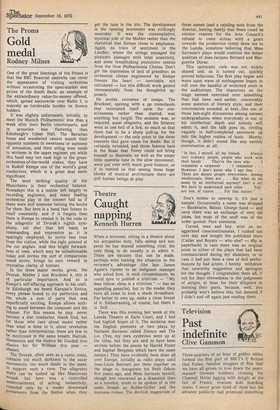The Proms
Gold medal
Rodney Milnes
One of the great blessings of the Proms is that the BBC financial umbrella can cover the appearance of visiting orchestras without occasioning the open-market seat prices of the South Bank: an example of the extraordinary value-for-money offered, which, spread nationwide over Radio 3, is scarcely an 'intolerable burden on licence holders.
It was slightly unfortunate, initially, to meet the Munich Philharmonic less than a week after their Berlin counterparts, and in acoustics less flattering than Edinburgh's Usher Hall. The Bavarian brass and woodwind cannot match their opposite numbers in sweetness or sureness of intonation, and their string tone tends to wiriness in the upper register; yet while this band may not rank high in the greatorchestras-of-the-world stakes, they have in Rudolf Kempe one of the world's great conductors, which is a great deal more significant.
The most striking quality of the Municheers is their orchestral balance. Nowadays this is a matter left largely to recording engineers, and many leading orchestras play in the concert hall as if there were still someone turning the knobs for them. But here is a band that listens to itself constantly, and if it forgets then there is Kempe to remind it. In the coda to the allegretto of Dvorak's eighth symphony, out shot that left hand, as commanding and expressive as it is sparingly employed, to invite less tone from the violins, while the right pointed at the cor anglais. And this bright forwardness of tone, which may be unfashionable today and invites the sort of comparisons noted above, brings its own reward in crystaline clarity of texture.
In the three major works given, the Dvorak, Mahler 2 and Bruckner 4, this is of particular importance. And so is Kempe's self-effacing approach to his craft. In Edinburgh we heard Karajan's Eroica, every phrase honed to icy perfection and the whole a sum of parts that was superficially exciting. Kempe allows nothing to stand between the composer and the listener. For this reason he may never become a star conductor, thank God, but for those who care about music rather than what is done to it, about revelation rather than interpretation, there are few to be mentioned in the same breath: Haitink, Horenstein and the elusive Mr Goodall (too elusive for Sir William this year — shame).
The Dvorak, often seen as a rustic romp, Contains too much darkness in the outer movements, too much doubt in the inner, to Support such a view. The allegretto Waltz can be lushed up like Mantovani rnuzak, but here was a controlled understatement of aching melancholy, consoled only by a tender downward Portamento from the fiddles when they
get the tune in the trio. The development in the opening movement was strikingly muscular. It was the contemplative, mystical side of the Mahler rather than the rhetorical that Kempe chose to emphasise. Again, no trace of sentiment in the Landler, where the strings managed the pizzicato passages with total unanimity, and some breathtaking pianissimo entries from the New Philharmonia Chorus. Don't get the impression of lack of grandeur; an orchestral climax engineered by Kempe freezes the heart — inevitable, not calculated — but this difficult work gained immeasurably from his thoughtful approach.
He avoids extremes of tempo. The Bruckner, opening with a pp tremolando that insinuated itself upon the consciousness rather than started, was anything but turgid. The andante was, as required, quasi allegretto, and the Scherzo went at one hell of a lick, so much so that there had to be a sharp pull-up for the development — the only point in the three concerts that gave cause for doubt. But it certainly twinkled, and those famous bars in the finale that Tovey could not bring himself to illustrate, as well as the soupy little operetta tune in the slow movement, were put over with much good humour, as if to remind us that among those huge blocks of musical architecture there are still human beings at play.


































 Previous page
Previous page